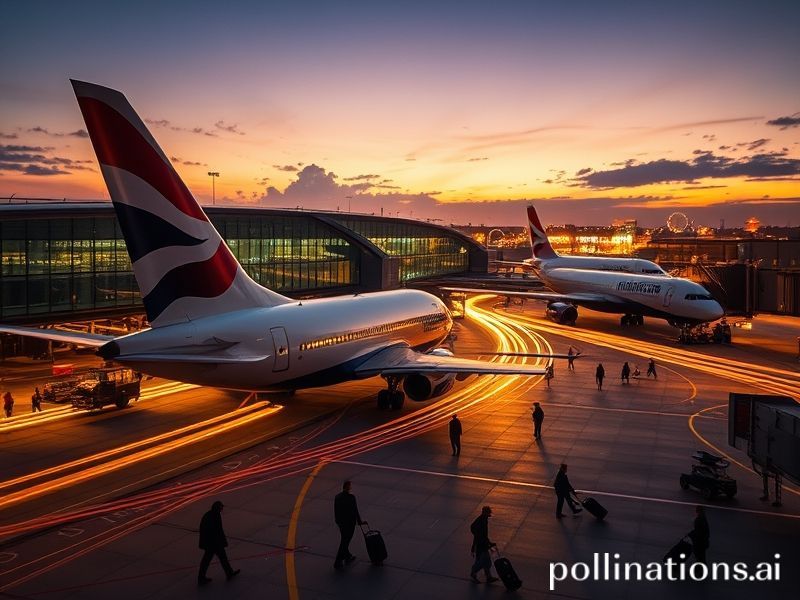heathrow
Heathrow: The World’s Largest Holding Pen for the Chronically Optimistic
By our man in Terminal 5, nursing lukewarm espresso and existential dread
LONDON—Somewhere between the perfume cloud at Duty Free and the slow-motion riot that is UK Border Control, Heathrow Airport quietly asserts itself as the planet’s most democratic purgatory. It doesn’t matter if you disembarked from Lagos, Lima, or Luton: everyone queues with the same haunted expression, united by the creeping suspicion that the luggage carousel is actually a casino wheel run by malevolent sprites.
From an international vantage point, Heathrow is less a British airport than a global sorting office for human ambition. Every day the place handles roughly 220,000 souls—equal to the population of Reykjavík—who arrive clutching visas, vape pens, and wildly divergent expectations of what “British punctuality” means. If nations are imagined communities, then Heathrow is their overworked customs officer, stamping passports like a weary god doling out second chances.
The airport’s strategic significance is hard to overstate. It sits at the crossroads of the Commonwealth’s nostalgia supply chain and the City of London’s money-laundering conveyor belt. A single runway closure—caused by anything from fog to a rogue drone operated by a bored teenager in Slough—ripples outward like a financial sneeze. Cargo that was supposed to be in Nairobi by sunrise stalls beside suitcases full of unsold NFTs, while hedge funds in Hong Kong watch the delay cascade across Bloomberg screens with the same detached horror usually reserved for missing yachts.
And yet, for all the talk of global connectivity, Heathrow remains a masterclass in planned inconvenience. The average passenger will spend 58 minutes trudging from gate to taxi rank, a duration that handily eclipses many domestic UK train journeys. This is sold as “world-class infrastructure,” which is marketing speak for “we’ve monetised your misery.” Want to skip the line? That’ll be £5 for the privilege of using a slightly shorter line—capitalism’s answer to Russian roulette, played with contactless payments.
Airside, the terminal resembles a UN summit after three gin-and-tonics. Businessmen in Patagonia vests negotiate cobalt deals over Pret sandwiches; Filipino nannies Facetime toddlers they haven’t seen in months; Saudi tourists photograph Harrods teddy bears like rare wildlife. The air itself is a cosmopolitan bisque of jet fuel, croissant, and quiet desperation. Somewhere, a small child is always crying, providing the unofficial soundtrack to late-stage globalization.
Climate campaigners occasionally glue themselves to the roof, demanding the place be turned into a lettuce farm. Their sincerity is admirable; their grasp of supply-chain logistics, less so. Heathrow’s bosses respond by pledging net-zero by 2050, a date so far away it might as well be the heat death of the universe. In the meantime, they’ll plant exactly enough trees to offset the CEO’s steak lunches and call it progress. Meanwhile, the third runway saga drags on like a Beckett play with subcommittees: a circular debate about whether endless growth can, in fact, be green-washed.
The darker joke is that Heathrow is already a climate refugee in waiting. Built on a floodplain, the airport’s departure boards could one day double as tide tables. Engineers assure us the runways can be raised by half a meter, which sounds reassuring until you remember the Thames Barrier was only designed to last until 2070. Should the North Sea decide to reclaim its territory, Terminal 5 will make a fantastic aquarium for future archaeologists to puzzle over. “Here,” they’ll say, prodding a fossilised WHSmith bag, “is where 21st-century humans paid £4.50 for water.”
Still, people keep coming. They come for jobs, weddings, asylum hearings, or simply the delusion that a change of latitude will fix a lifetime of poor decisions. And Heathrow, eternally understaffed and overpriced, welcomes them all with the same transactional embrace: give us your biometric data and your last ten years of travel history, and we’ll give you 45 minutes of free Wi-Fi before the existential dread kicks in.
In the end, perhaps that is Heathrow’s true global significance: a monument to humanity’s refusal to learn from its own hubris. We know flying is cooking the planet, know queues are bad for blood pressure, know the croissants are shipped frozen from France. Yet we book anyway, seduced by the promise that somewhere beyond the security theatre lies a better version of ourselves—tan, rested, and only slightly jet-lagged.
The gate is boarding. Try not to think about the carbon.







